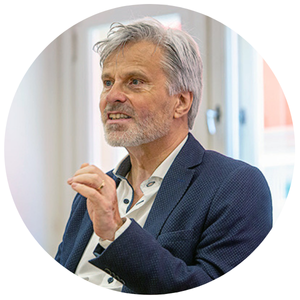Keynotes

Ronny Bruffaerts
Associate Professor of Psychiatry, KU Leuven
Ronny Bruffaerts is professor of psychiatry at KU Leuven, Leuven, Belgium. He studied theoretical (1997) and clinical psychology (1998), is a registered psychotherapist (since 2004), and obtained a PhD in Medical Sciences (2005). He has headed the Center for Public Health Psychiatry since 2017. His main research field is psychiatric epidemiology, where the focus lies on monitoring population dynamics of mental disorders and suicidal thoughts and behaviors. Among others, he co-directs the global WMH-ICS initiative, and leads several other major epidemiological and evaluation studies on psychiatric emergencies, primary care psychology, and intensive treatment of severe mental disorders.
Ronny Bruffaerts will give a keynote on Mental Health Amongst Students: Understanding the Current State of Affairs.
Higher education has seen rising enrollment, mobility, and diversity, with around 254 million students globally—a figure that has doubled since the early 2000s. The college years (ages 18-30) coincide with key developmental phases, marked by personal, social, and academic stressors like leaving home and adjusting to new environments. This period is high-risk for mental health issues such as anxiety, depression, and substance abuse, which negatively impact academic success and future quality of life. The COVID-19 pandemic increased attention for students’ mental health due to isolation, online learning, and fears of infection. Despite growing attention to emotional problems, many students do not seek help due to stigma or unawareness, resulting in inadequate treatment and fragmented mental health services. These facts and figures present significant challenges in addressing mental health within higher education and beyond. In our presentation, we offer a thorough, critical review of the existing research on college mental health, including key epidemiological data on mental disorders, theory-driven approaches to developmental phases and challenges faced during college and beyond.

Martijn Janse
President of the Lieve Mark Foundation
Martijn Janse is the founder and president of the Lieve Mark Foundation in Leiden, the Netherlands. Martijn will talk about how the foundation was launched during the COVID-19 pandemic as a student-led initiative to improve student wellbeing among fellow students. Since then, the foundation has been committed to giving young people a greater voice in policies that directly affect them. From concept to impact, the foundation actively engages young people in (scientific) participatory research on themes that matter to them, such as mental wellbeing, substance use and polarization. The foundation has given rise to various other initiatives, such as the national theater show ‘COKE SHOW’ and the Student Association Wellbeing Guide, which offers student associations practical tools to improve wellbeing within their communities.
Martijn Janse will give a keynote on Students as game changers: student wellbeing through participation.

Hans Schilderman
Professor of Empirical and Practical Religious Studies, Radboud University Nijmegen
As keychairholder professor Hans Schilderman engages in conceptual and empirical research regarding empirical and practical aspects of religion. Based on his personal chair ‘religion and care’, he especially focuses on the religious significance of quality of life in various situations in which people suffer physically or mentally. As coordinator of the master ‘spiritual care’ he publishes on professionalisation issues in spiritual care.
Hans Schilderman the title of his keynote address is Spiritual Care at Universities. A Position Paper.
In this lecture, Prof. Schilderman addresses the question of the domain of spiritual care in a university setting: what is this specialty of student ministry, taking note of the increasing wellbeing problems of students and the rise of university services dealing with these problems? He will elaborate his position as follows. First, he will point out some characteristics of the wellbeing problems that students are increasingly confronted with. Secondly, he will point out what spirituality is. Thirdly, he will address the problem of university chaplaincy as a provision for spirituality that is stuck between vastly different institutional backgrounds and their concomitant varying social roles and professional tasks. Fourthly he will address some professional and strategic issues that are needed to develop this domain of spiritual care at universities. Fifthly and finally, he will summarize his case and validate the position that he takes in this contribution.

Anne Vandenhoeck
Assistant Professor of Health Care Chaplaincy and Diakonia, KU Leuven
Anne Vandenhoeck (Leuven, 1964) is assistant professor in pastoral care and diakonia and chair of the Academic Centre for Practical Theology at the Faculty of Theology and Religious Studies, KU Leuven. Her research focuses on pastoral care in several areas, especially in health care, and on practical theology and diakonia. She is a member of the Research Unit Pastoral and Empirical Theology.
Anne Vandenhoeck published several articles on spiritual and pastoral care in health care. She is the co-author of books on dementia and supervision and co-editor of books on prophetic pastoral care. She served as coordinator of the European Network for HealthCare Chaplains (ENHCC) between 2010 and 2016.
Anne Vandenhoeck will give a keynote on Professional Flourishing in Chaplaincy: Lessons from Health Care Chaplaincy.
Just like their colleagues in other sectors of pastoral care, university chaplains feel increasing external pressure to demonstrate their added value to higher education. Recent developments in research on the impact of healthcare chaplaincy serve as a model in this regard. The implementation of research findings and self-reflection on professionalism demonstrate the integration of healthcare chaplaincy into the healthcare system. University chaplaincy stands at the beginning of a new story, yet to be written. What can university chaplains learn from healthcare chaplains, especially in terms of professionalizing their role?
